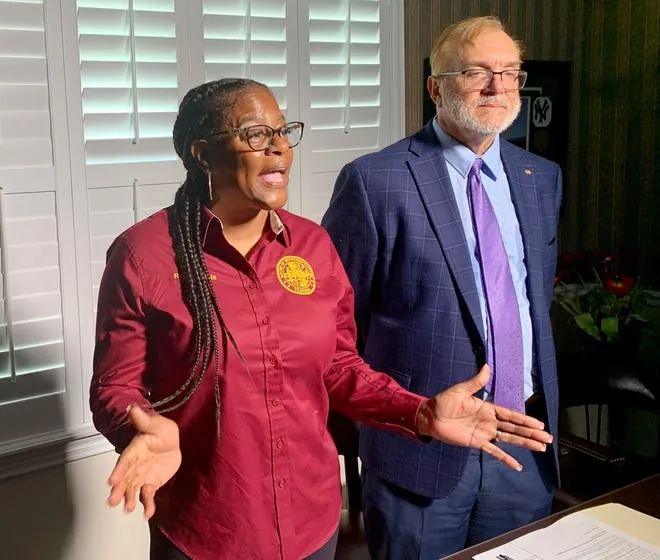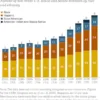
State Rep. Kimberly Daniels says the new Black history standards for Florida public school students are wrong to say slavery resulted in any benefits for those enslaved, and she will use her seat on the state African American History Task Force to fight against that message going to classrooms.
Daniels, D-Jacksonville, said she has not yet talked to Florida Education Commissioner Manny Diaz, Jr. about her concerns. Diaz and Gov. Ron DeSantis have defended the standards in the face of criticism by Vice President Kamala Harris who blasted it as an attempt to “replace history with lies” when she gave a speech in Jacksonville on July 21.
Daniels, who was appointed by Diaz in May to the African American History Task Force, said she’ll work through that panel to make changes to language that she said upset many people in the community.
“I think it was not worded right and and it gave the wrong message and I don’t agree with it, and that’s the bottom line,” she said.
Party split:Controversial Florida African American history standards stirring intra-Republican feud
Presidential campaign:‘No silver lining in slavery’: Tim Scott blasts Ron DeSantis on Florida’s new Black history standards
Vice President Harris:Veep rips Florida slavery teaching while DeSantis reboots by booting campaign staff
Daniels faced controversy over her own statements about slavery when video surfaced in 2011 during her successful run for Jacksonville City Council that showed her saying she thanked God for slavery while she was speaking as a pastor.
“I thank God for slavery,” she said in the video footage from a church. “I thank God for the crack house. If it wasn’t for the crack house — come on, somebody — God wouldn’t have been able to use me how he can use me now. And if it wasn’t for slavery, I might be somewhere in Africa worshipping a tree.”
Daniels said at a news conference on Thursday the “thank God” comments were about overcoming horrible adversity. She said she objects to any directive for teaching Black history that would suggest slaves gained anything from being enslaved.
“Slavery as it existed was cruel, inhumane and an oppressive institution that had roots in the United States, including Kingsley Plantation in northeast Florida, and was not a benefit to African-Americans,” she said at the news conference at the law office of Robert Slama in Jacksonville. “Slaves had to learn how to care for their families under very harsh and oppressive conditions.”
She said the state must “ensure that the history of slavery and its impact on African-Americans is correct, not sanitized and reflects the plight of the people, then and now.”
Vice President Harris speech in Jacksonville slammed curriculum
The state’s Black history standards became a national political debate when Harris came to Jacksonville on July 21 in response to the Florida Board of Education’s adoption of the state’s African American history courses for students. One provision opposed by Harris and civil rights groups is a benchmark for middle schoolers to understand that “… slaves developed skills which, in some instances, could be applied for their personal benefit.”
Mayor Donna Deegan also criticized it, saying “any insinuation that slavery was a benefit to Black people is offensive.”

Daniels said the teaching standards have good parts in them but she disagrees with the one about “personal benefit.”
As Florida’s approach to Black history roiled state and national politics, video snippets of Daniels talking about thanking God for slavery have popped up again on social media posts that incorrectly said she was involved in creating the education standards.
The African American History Task Force did not work with the state Department of Education on them. The Department of Education instead created a separate working group a year ago to review the standards for teaching about African American history.
Asked at the news conference why she didn’t review the standards after they became available so she could give her own comments through the task force, Daniels said that during one of the task force meetings, she was participating online while coming off being in bed sick for three weeks.
“I’m not making that as an excuse,” she said. “I’m telling you the truth. I did not know that particular part was in there and I would have adamantly stood against it.”
The state Department of Education did not respond to emailed questions about why Diaz selected Daniels as a member of the task force or whether he was aware of her past statements in the video. The Department of Education would not even confirm that Daniels is a member of the task force.


